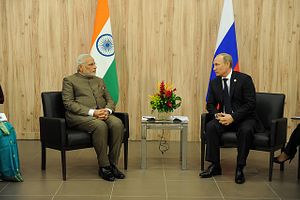India and Russia will once again try to fix a partnership that is badly in need of repair. It is often said that India and Russia share longstanding ties that are durable. The end of the Cold War hasn’t finished this relationship, but there are signs that this relationship needs some repair urgently. Indian Prime Minister Narendra Modi will be in Russia on June 1 for the annual India-Russia summit where he is expected to unveil, along with Russian President Vladimir Putin, an ambitious document to outline their agenda for economic cooperation in the coming decades. Earlier this month, the two nations have moved their relationship forward in a range of sectors, including civil nuclear cooperation, trade, and investments, during the meeting of India-Russia Inter-Governmental Commission on Trade, Economic and Cultural Cooperation (IRIGC-TEC), a key forum to address major issues concerning bilateral ties.
There is an urgent need to prioritize economic ties, which have been going downhill for some time. Though the two nations have set a target for their bilateral trade of $30 billion by 2025, it was a measly $7.8 billion in 2015. So there is now talks about targeting pharmaceuticals, agriculture, food processing, and energy as a new focus. The two nations are yet to conclude the General Framework Agreement (GFA) for units 5 and 6 of the Kudankulam nuclear plant and two deadlines have been missed since last year. The pact is now likely to be signed during the 18th annual India-Russia summit next month. The much delayed International North South Transport Corridor will also be fast tracked in a fresh attempt to give a boost to regional connectivity.
It remains to be seen if this fresh attempt will be enough to alleviate political tensions in the India-Russia relationship. There is concern in New Delhi that Moscow’s decision to side with China would help Pakistan get away from global isolation. At the 2016 BRICS summit in Goa, Russia did not back India’s demand to name two Pakistan-based terror groups as perpetrators of terrorism against India, thereby shielding Pakistan from censure.
This shift in Russian stance is also evident when Russia re-emphasized its role in Afghanistan, coming almost four decades after the 1979 Soviet invasion of the country. Russia hosted a February six-nation conference in Moscow on Afghanistan’s future with India, Iran, Pakistan, China and Afghanistan. This was Russia’s second initiative after the first trilateral conference in December, 2016, with only China and Pakistan. The December conference agreed upon “a flexible approach to remove certain [Taliban] figures from [United Nations] sanctions lists as part of efforts to foster a peaceful dialogue between Kabul and the Taliban movement.”
Vladimir Putin, intent on viewing South Asia through the prism of Russia’s geopolitical competition with the West, may have decided that it was time to tilt towards Pakistan. U.S.-Pakistan ties may have hit the nadir and the new U.S. administration, showing isolationist tendency, remains consumed by multiple domestic crises. The global arms market has become more difficult for Russia to navigate, too. When China decides to produce its own weapons rather than procure them from Russia, Moscow needs new buyers.
Moscow and Islamabad held their first joint military exercise in September 2016 and their first bilateral consultation on regional issues in December. Russia lifted an arms embargo against Pakistan in 2014 and will send four Mi-35M attack helicopters this year. Russian troops participated in this year’s Pakistan Day military parade. And the China-Pakistan Economic Corridor linking Xinjiang to the Pakistani port of Gwadar could be merged with the Russia-backed Eurasian Economic Union. In contrast, India became one of the few countries to boycott the Belt and Road Forum organized by China earlier this month.
It is against the background that Modi will hope to strengthen India-Russia ties when he meets Putin next month. Whether he will succeed, of course, remains a question.
































